The Dean ACR Newsletter is delighted to launch our newest Social Impact Trailblazer series with one of our most Distinguished Alumni – Dr. Pramod Chaudhari.
Through this series, we aim to highlight alumni who are exceptionally successful in their chosen careers and driving meaningful change in society. Dr. Chaudhari’s journey in pioneering sustainable technologies by setting up Praj Industries (a global leader in Bioeconomy) and his dedication to fostering social and environmental impact perfectly embodies this mission. Dr. Chaudhari’s vision has played a pivotal role in shaping India’s sustainable energy landscape and has demonstrated how business success and social responsibility can go hand in hand.
In this conversation, Dr. Chaudhari reflects on his journey—from his formative years at IIT Bombay to his entrepreneurial success, his focus on social impact, and the importance of giving back to the community.
We have also included a profile of Praj Industries after our conversation and the impact it continues to make on the renewable energy sector in India and globally.
- Thank you, Dr. Chaudhari, for speaking to the Dean ACR Newsletter. We would like to begin by asking you to share some of your fondest memories from your time at IIT Bombay. How did your time at the institute shape your professional journey and outlook on giving back to society?
My desire to contribute to society was partly influenced by my time at IIT Bombay, where I was exposed to ideas of social responsibility and philanthropy. The Institute fostered these values in me but also, my family background in service— my grandfather was a freedom fighter and my father upheld similar values— instilled in me the importance of giving back. These influences, coupled with experiences at IIT Bombay, became a foundational aspect of my commitment to social impact.
One key event I recall from my time as a student was when many of us were mobilized to assist in relief work following a natural disaster in a tiny village in the 1960s. In December 1967, Maharashtra was rocked by a strong earthquake that shook the Koyna River Dam. Under the guidance of then-director Brigadier Bose, we applied our technical training in a meaningful way, building a school and other infrastructure to support the affected community. This experience allowed me to witness the importance of technical expertise in social initiatives and the service engineers could provide in modernizing the economy of rural India. I was even more convinced to use my skills for the betterment of society.
- That’s incredible! So, after graduating from IIT Bombay, you chose to stay in India and work in fields that directly impact the country, such as biofuels and biotechnology. What drove you to focus on these sectors rather than pursuing more conventional career paths?
I was drawn to the field of biofuels and biotechnology as I explored various entrepreneurial opportunities. I eventually recognized the potential of biofuels as a good business model as well as a sustainable energy source that could benefit both the environment and local farming communities.
I ventured into biofuels in the early 1980s, catalysed by my background in engineering and entrepreneurial spirit. The 1973 oil crisis, which led to a surge in oil prices, prompted countries like Brazil to adopt biofuels, and I realized that India could similarly benefit. My childhood experiences growing up near sugar mills exposed me to the potential uses of sugarcane byproducts, which I later harnessed for biofuel production.
My goal was to create sustainable alternatives to fossil fuels and support rural economies.
- Can you take us through the journey of setting up Praj Industries?
The journey started in 1983 as an agri-venture. Our early focus was on using sugary feedstocks to generate ethanol, even though ethanol was not widely recognized as a green fuel at that time. We emphasized the R&D to develop technological solutions for sustainability. Brazil’s pioneering work in converting sugarcane into energy served as an inspiration, yet India’s approach needed to differ due to our more rural landscape and infrastructure needs. Over time, however, Praj Industries progressed so significantly in its technological capabilities for ethanol production that we began exporting our solutions back to Brazil and to other countries, including Colombia, where Praj now holds a substantial market share with its fermentation technology.
Praj set up a world-class R&D centre in 2008 at Pune, where the company focuses on foundational research and development in Bioeconomy. After extensive research over the last decade, Praj developed Enfinity technology to produce second-generation ethanol from agricultural and first residue. Praj also forayed into developing technology for other biofuels like Compressed Biogas (CBG), Sustainable Aviation Fuel (SAF), Biohydrogen, etc. Recently, we have introduced a Renewable Chemical & Material platform starting with Bioplastics like PLA and PHA, furthering our commitment to environmentally responsible innovations. These developments reflect Praj’s commitment to sustainability, which is a core value of the company’s mission.
I also feel it’s important to mention that collaborating with like-minded individuals and acquiring technical expertise is key. We developed the necessary manufacturing skills and technological innovations that enabled us to advance India’s biofuel industry. Strategic partnerships and industry-academia collaboration to create a Centre of Excellence enabled us to empower young minds for sustainability. This work, deeply rooted in sustainability and social responsibility, exemplifies our ongoing commitment to creating an impact aligned with India’s environmental and societal needs.
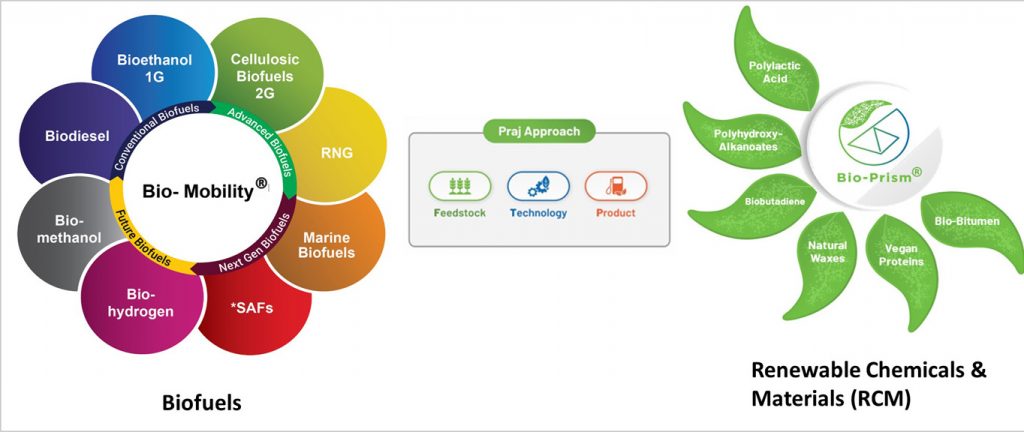
Praj Bio-Mobility & Bio-Prism Platforms: Sustainable Climate Action through Bioeconomy
Right now at Praj, there are two key areas of interest: Bio-mobility® and Bio-prism®. While Bio-mobility® (different biofuels) is already well established, Bio-prism® (renewable chemicals and materials) is still developing. These two areas represent different stages in the adoption of sustainable technologies.
- Switching gears to your philanthropy – from establishing the Pramod Chaudhari Alumni Continuing Education Centre (PCACEC) to facilitate the lifelong learning of alumni in 2021 to Chair Professorships to setting up the Centre for Learning and Teaching (PPCCLT) in 2019 to adopt global best practices in teaching and learning, you’ve been involved with several philanthropic and educational initiatives towards your alma mater. Can you share your motivations for contributing to such causes?
Well, IIT Bombay’s cutting-edge education and mentorship played a pivotal role in shaping my career and I desired to support and sustain the Institute’s mission. I will always have an enduring connection with IIT Bombay since I received a top-quality education there for a very discounted price. My philanthropic efforts towards the Institute focus on providing soft solutions—initiatives that foster skill development and innovation—rather than on building infrastructure alone. I hope that my contributions will fill the gaps that the Institute identifies as vital, such as courses for alumni to enhance their skills and adapt to evolving technological landscapes.
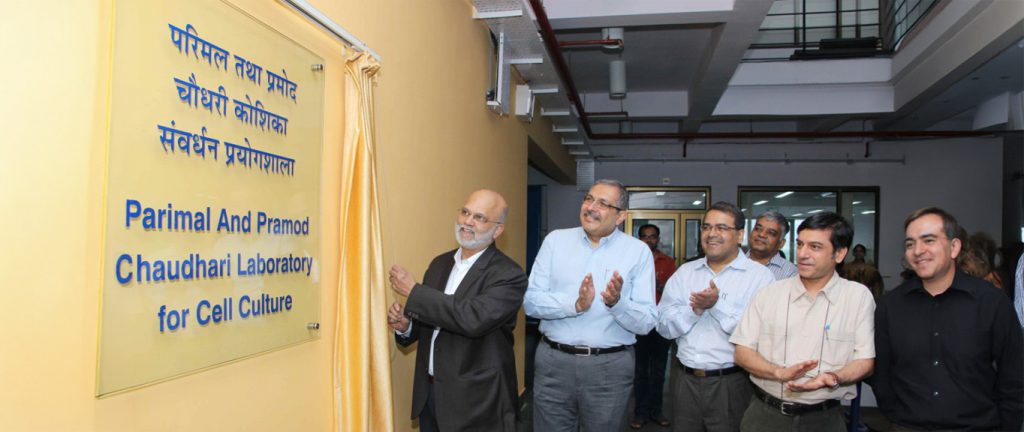
Dr. Chaudhari inaugurating the laboratory for Cell Culture at IIT Bombay
We currently have seven projects at the Institute and hope to do more in the upcoming years.
- As someone who has actively given back to IIT Bombay and the broader community, what message would you share with fellow alumni about the importance of contributing to social and educational causes?
One of the biggest issues we have with more engagement is the misconception among many alumni that IIT Bombay is fully funded by the government. This assumption is just not true anymore and prevents IITB alumni from realizing the importance of their own contributions. I hope that IIT Bombay raises more awareness around this issue to encourage more alumni to support the Institute financially and in other ways. I also feel that, culturally, our tendency has always been to prioritize our own immediate financial gains, such as high salaries and benefits, over the long-term impact we can have by way of philanthropy and giving back. I hope that we can shift the focus away from salary statistics to values and service.
- What advice would you offer to current IIT Bombay students who are passionate about making a difference through entrepreneurship, technology, or sustainability?
First of all, I think the current generation of students are so brilliant that they don’t need any advice from me. That’s why I no longer give any lectures!
I will say that I wish that the youngsters today, and young engineers from IIT Bombay, would not “rush” to pursue opportunities only in Computer Science and migrate to the U.S. This is often at the expense of other engineering fields. There is so much opportunity and scope in other engineering fields. We have so much trouble finding good engineers! Not to mention the media portrayals of high salaries for top graduates can mislead the broader student population.
While I don’t have any advice, I just hope that as I was able to create a balance in my career – marrying profitability with social and environmental impact, with philanthropy as an essential element of the process – they can be inspired by my journey to do the same.
As far as the Institute goes, I hope that IIT Bombay can build a culture where students and alumni engage more deeply with societal issues. I would encourage the Institute to recognize students and give awards that are focused specifically on social impact. I think this would inspire our students to think beyond academic and professional achievements. By encouraging community engagement, I believe that IIT Bombay can nurture a sense of responsibility and commitment among students, extend the Institute’s impact beyond the campus, and foster a socially conscious alumni network.
- Finally, throughout your career, is there a particular philosophy or guiding principle that has helped you align your business goals with creating a positive societal impact?
No. There isn’t any specific ideological framework I follow. What is important to remember is to be conscious of one’s ecosystem. This awareness can help broaden perspectives, especially in business. My business model is community-cantered, supporting farmers and other stakeholders. Honestly, giving back comes naturally to me, and they’re a result of all my experiences and values.
Thank you, Dr. Chaudhari, for sharing your valuable insights and experiences with us. Your dedication to creating a positive social impact through your work is truly inspiring. As we launch this new series highlighting the social impact made on the very fabric of India by our alumni, your journey sets a remarkable precedent for others to follow. Thank you for being a symbol of change and for representing IIT Bombay with such distinction.
THE EVOLUTION OF PRAJ INDUSTRIES: A LEGACY OF SUSTAINABILITY AND INNOVATION
In a world striving for sustainable solutions, Dr. Pramod Chaudhari’s journey as an IIT Bombay alumnus and the visionary founder of Praj Industries exemplifies how technology and social purpose can come together seamlessly. Through Praj Industries, Dr. Chaudhari has redefined industrial growth by pioneering bio-based solutions that advance environmental sustainability while strengthening rural and national economies. His accomplishments are a powerful testament to IIT Bombay’s role in inspiring a generation of socially conscious entrepreneurs, ready to address the world’s most urgent challenges.
Driving National Energy Transformation through Biofuels
Dr. Chaudhari’s impact on India’s energy landscape began with a vision to reduce the nation’s dependency on fossil fuels. He was deeply inspired by Brazil’s pioneering work in biofuels since the 1960s, which showcased the potential of alternative fuels like ethanol and biodiesel as viable replacements for traditional fossil fuels. This global shift inspired Dr. Chaudhari to drive similar advancements in India, where he recognized the need for sustainable energy solutions. Building on this vision, Praj Industries embarked on its research journey in 1983, initially developing technology to produce ethanol from molasses and grains.
By the end of the 20th century, the world started to take cognisance of energy security, climate change, net-zero, etc. Concurrently, the Indian government set an ethanol blending target of 5% in 2003, but progress was slow and by 2015 it had only reached 2%. With government policy advocacy for biofuels and circular economy initiatives (to which Praj contributed significantly), biofuels gained more attention from 2015 onwards. In 2018, to expedite the adoption of ethanol blending, the government announced a more aggressive National Biofuel Policy, targeting 20% ethanol blending by 2030. Praj Industries helped advance India’s biofuel program, helping the country reach a 10% ethanol blend in its fuel supply by August 2022, significantly ahead of its initial targets. Given the fast adoption rate, the government advanced the target to 2025. The ethanol blending in fuel across the country is now approximately 16%, and this progress is a foundation of India’s broader efforts to shift towards biofuels and sustainable energy sources.
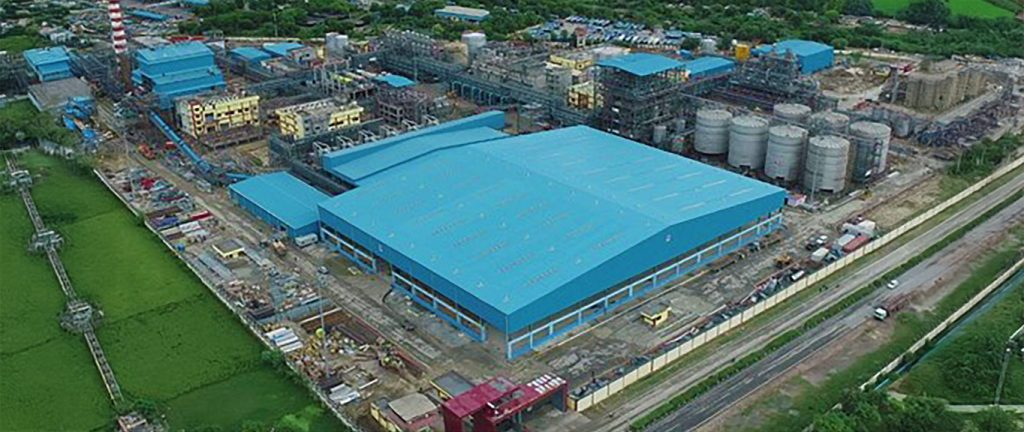
Asia’s first 2G Ethanol Plant based on Praj’s Indigenous Technology
Over the years, Praj’s focus expanded to second-generation ethanol technology that utilizes agricultural and forest residues to produce fuel ethanol. Praj’s second-generation ethanol (2G) technology now converts agricultural and forest residues like rice-wheat straws, bagasse, bamboo, softwood, etc. into fuel ethanol. 2G ethanol technology not only offers an additional source of income to farmers but also mitigates the environmental pollution due to stubble burning, proving to be a real waste-to-wealth solution.
Inaugurated by the Hon. Prime Minister of India, Shri Narendra Modiji, Asia’s first 2G ethanol plant based on Praj’s indigenous technology has been commissioned by Praj at Panipat, Haryana, for IOCL. Two other commercial-scale plants are in the final stages of completion for BPCL and HPCL. These projects demonstrate real-world impact and provide a sustainable energy alternative that supports rural economies while strengthening India’s energy independence.
Praj has contributed significantly to the success of India’s Ethanol Blending Programme with around 70% of the market share. With the current 16% blending achievement, India is producing over 550 Cr litres of ethanol per annum. So far, India has saved more than 1 Lakh Crore litres of oil import, reducing CO2 emissions by almost 545 Lakh MT.
Expanding the Umbrella of Bioenergy
Further expanding the reach of bio-based fuels, Dr. Chaudhari has championed compressed biogas (CBG) as an eco-friendly alternative to compressed natural gas (CNG). Praj’s “Rengas” technology for CBG production uses agricultural and industrial waste, offering a renewable fuel source for transportation and cooking. With the Indian government’s commitment to establishing 5,000 CBG plants and up to 5% of CBG blending obligation in city gas distribution, Praj is leading a transformative energy shift, promoting rural empowerment by providing end-to-end technology to convert waste into wealth. As Dr. Chaudhari notes, “CBG is not just a fuel; it’s a step towards energy self-reliance.”
The aviation sector contributes to 2-3% of the Greenhouse gas (GHG) emissions. It is hard to abate due to weight and size constraints, as well as safety challenges. Dr. Chaudhari continues to push the boundaries in sustainable fuel alternatives by extending Praj’s biofuel expertise to aviation as well. Praj’s Alcohol-to-Jet (ATJ) technology enables ethanol to be converted into sustainable aviation fuel (SAF), setting new standards in green technology for airlines. India’s first commercial passenger flight using SAF (supplied by Praj) flew from Pune to Delhi in 2023. While SAF currently involves a cost premium, Dr. Chaudhari is confident that with scaling, SAF can achieve price parity with conventional jet fuel in the future.
This pioneering work in aviation supports India’s green technology aspirations and highlights the potential for homegrown solutions to make a global impact in an industry often criticized for its carbon footprint.
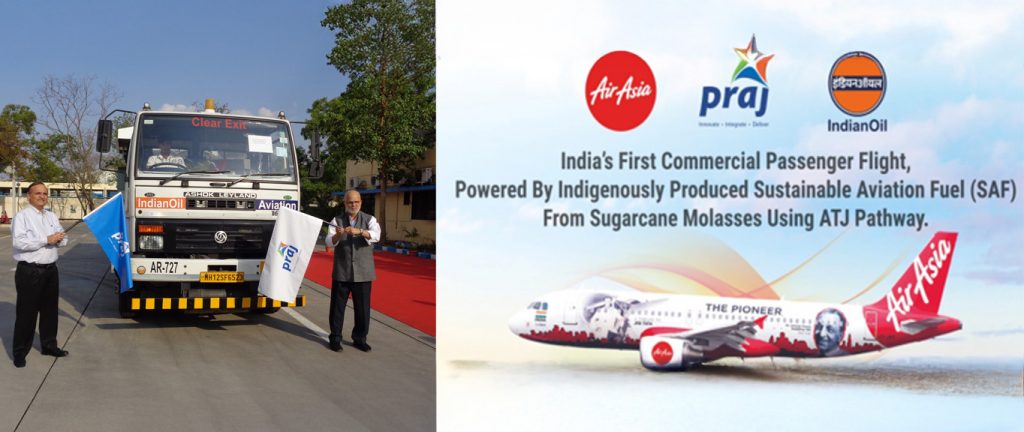
As a forward integration to CBG technology, Praj is committed to demonstrating biohydrogen production technology based on the Steam Methane Reformation (SMR) process. Praj is planning to establish a demonstration plant with a dispensing unit in line with India’s “National Green Hydrogen Mission.” Dr. Chaudhari strongly believes that biohydrogen has tremendous potential to cater to large energy demands sustainably in the future.
Dr. Chaudhari’s foresight extends beyond biofuels to emerging fields like Biomanufacturing and Renewable Chemicals & Materials (RCM). In the field of sustainable materials, Praj’s “BioPrism” platform focuses on developing biopolymers starting with Polylactic Acid (PLA) and Polyhydroxy Alkanoates (PHA), offering a biodegradable option to combat single-use plastics. The recent inauguration of Praj‘s (and India’s) first-of-its-kind demo facility for the production of biopolymers in Jejuri, Pune, by the Hon. Union Minister of Science and Technology, Shri Jitendra Singh Rana, marks a major milestone in mainstreaming biobased renewable chemicals and materials.
To accelerate industrial biotechnology research, Dr. Chaudhari has formed various Centres of Excellence (CoEs) with renowned institutions keeping in mind the entire value chain from feedstocks to end products. To address challenges related to feedstocks, a CoE was formed with Vasantdada Sugar Institute, Pune, to develop alternate feedstocks. Another CoE with the Institute of Chemical Technology, Mumbai, is developing biopolymer applications based on circular bioeconomy. A CoE in sustainability has been formed with the Gokhale Institute of Politics and Economics, Pune, and more recently, a CoE is being developed with Savitribai Phule Pune University to drive futuristic research in sustainability through synthetic biology and harnessing Artificial Intelligence.
Each of these initiatives underscores Praj’s, and by extension, Dr. Chaudhari’s, commitment to a circular economy, where waste is continually repurposed for new value.
Uplifting Communities: Social Responsibility and the “Net Zero Village” Initiative
Praj has been involved in CSR activities since long before it became mandatory for Indian companies in 2013-14. Beyond the industrial arena, Dr. Chaudhari’s commitment to sustainability has reached India’s rural communities. Praj Foundation has prioritized environment conservation, education, skill development, and women’s preventive healthcare. Praj has also initiated the “Net Zero Village” project, which brings energy self-sufficiency to remote areas by leveraging local resources for power generation and economic upliftment. Designed as a replicable model, this project empowers villages to achieve energy independence and turning sustainable innovation into tangible community transformation. Praj’s ethos, captured in its guiding principle of “People, Planet, and Profits,” is a reflection of Dr. Chaudhari’s commitment to socially responsible growth.
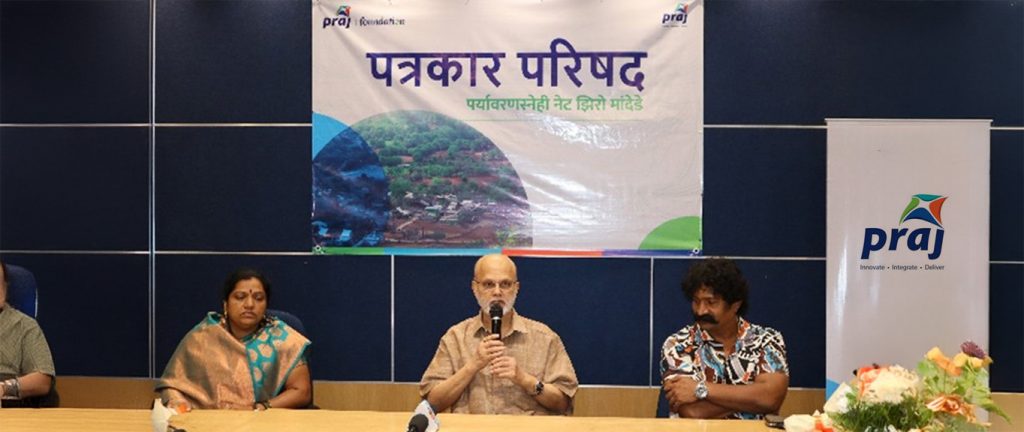
Dr. Chaudhari announces the Net Zero Village initiative at a Press Conference
In addition to CSR, Dr. Chaudhari is a strong proponent of Personal Social Responsibility (PSR) and has been motivating all Prajites to volunteer for social causes. He is also committed to social upliftment through the Parimal and Pramod Chaudhari Foundation (PPCF), a personal philanthropic endeavour. PPCF has been transforming the lives of meritorious and needy students from economically disadvantaged backgrounds through fellowship programmes and strengthening the infrastructure for healthcare and old age homes. Through PPCF, Dr. Chaudhari has also supported academic research in institutes like his alma mater and the Institute of Chemical Technology through Chair Professorships and research funding.
Building a Future through Sustainable Vision
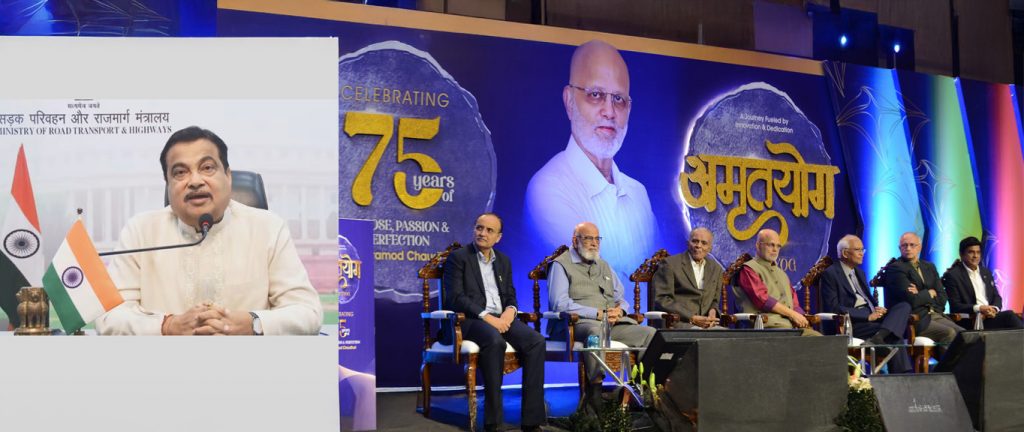
The Hon. Cabinet Minister, MoRTH, Shri Nitin Gadkari speaks highly of Dr. Pramod Chaudhari during his Amrutyog celebrations
Dr. Chaudhari recently completed his 75th birthday on 26th November 2024 – a milestone that was celebrated as “Amrutyog” by all Prajites. This occasion coincided with the Ruby year celebration of Praj and was applauded by the bioeconomy community, scientists, technologists, peer sector leaders, and ministry, acknowledging his contribution to industrial biotechnology.
During the gala function, Padma Vibushan awardee and renowned scientist, Dr. Raghunath Mashelkar, appreciated Dr. Chaudhari’s vision and application of innovation for the environment and planet while the Hon. Minister for Road Transport and Highways, Shri Nitin Gadkari, wished for Dr. Chaudhari’s continued contribution and guidance to pave the way towards an Aatmanirbhar Bharat in energy.
**********
Dr. Chaudhari’s story is a powerful reminder of what is possible when education, ambition, and social conscience come together. He stands as both an innovator and a changemaker, embodying the values of his alma mater and paving the way for a sustainable, self-reliant future for India and beyond.
Dr. Chaudhari’s contributions are also a vivid demonstration of the transformative impact that IIT Bombay alumni continue to make on a global scale. His leadership exemplifies the unique intersection of technical acumen, environmental stewardship, and social responsibility which is at the core of its alumni community and which goes on to drive change across industries and geographies. In an era where sustainable development is not just an option but a necessity, Dr. Chaudhari’s work serves as a model for industries worldwide, proving that technology can, indeed, power positive and lasting social impact.
IIT Bombay’s legacy resonates deeply within Dr. Chaudhari’s journey—from his roots at the Institute to his accomplishments at Praj Industries. This influence shines through in his dedication to fostering not just profitable ventures but solutions that positively impact society and the environment. His efforts embody the spirit of IIT Bombay, which consistently inspires its alumni to integrate innovation with social purpose.

